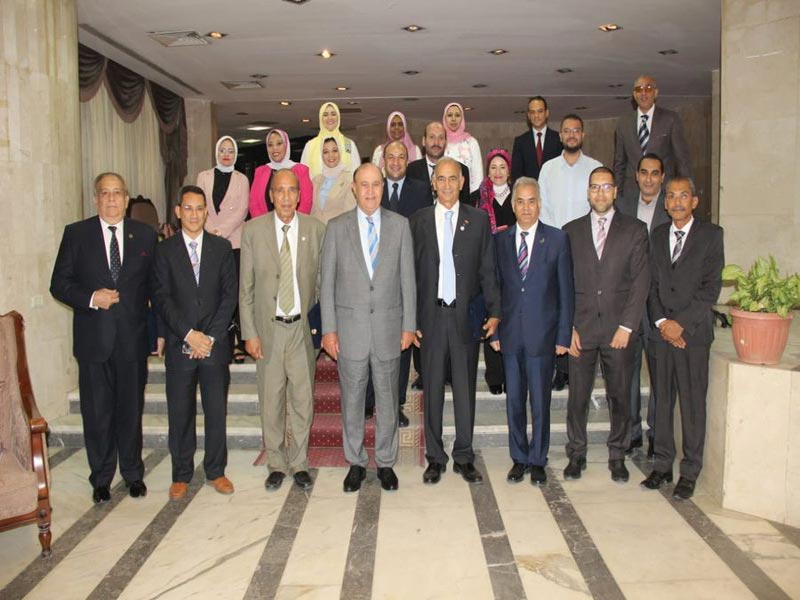
The Egyptian Navy in the wars of attrition and October... A symposium at the Faculty of Archeology
Under the patronage of Prof. Dr. Mahmoud El-Meteini, President of Ain Shams University, Prof. Dr. Abdel Fattah Saud, Vice President for Education and Student Affairs, Prof. Dr. Ayman Saleh, Vice President for Graduate Studies and Research, Prof. Dr. Ghada Farouk, Acting as Vice President for Community Service and Environmental Development, and Prof. Dr. Hossam Tantawy, Acting Dean of the Faculty of Archeology, the Faculty of Archeology organized a symposium in cooperation with the Egyptian Naval Salon on the occasion of the glorious October War victories.
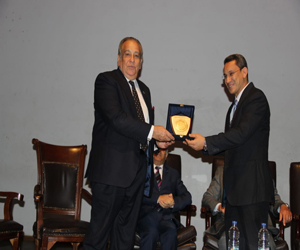 |
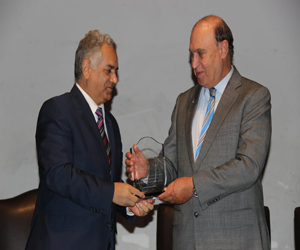 |
|||
The symposium was titled "The Egyptian Navy in the Wars of Attrition and October", in which Lieutenant-General Mohab Mameesh, Presidential Adviser to the projects of the Suez Canal axis and former commander of the Navy, and Major General Staff Mahmoud Ahmed Metwally of the Naval Forces commanders, military and strategic expert and Secretary of the Egyptian Naval Salon, and Captain Nabil Abdel Al-Wahhab is one of the heroes of the destruction of the destroyer Eilat, and Captain Omar Ezz El-Din is one of the heroes of the raids on the port of Eilat, in the presence of Prof. Dr. Mahmoud El-Damaty, the former Minister of Antiquities and the former Dean of the Faculty of Archeology, Ain Shams University, and a group of faculty members and students.
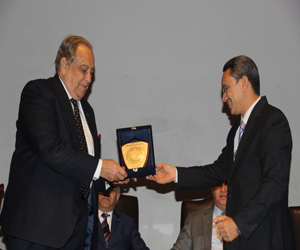 |
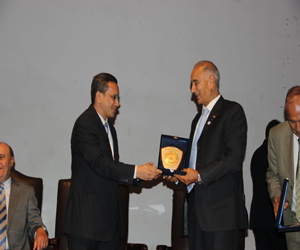 |
|||
Prof. Dr. Hossam Tantawy, Dean of the Faculty, honored the guests. He also congratulated everyone on the glorious October victories.
His Excellency made it clear that in the month of October of each year, the scent of the Egyptian armed forces’ championships resounds, which restored Egypt’s glory, elevation and land, by the grace of God Almighty and the strength and determination of men.
He added, “The Navy remembers with pride and pride on the 21st of this month, as the most magnificent naval victory witnessed by the region, with the creativity of men for the emergence of Egyptian missiles, who wrote a new page and brought about a fundamental shift in naval strategic thought and changed the concepts of using naval missiles when they destroyed the Israeli destroyer Eilat Fakhr.” Then launch missiles in 1967, less than 4 months after the June defeat.
The period following the June 1967 war and until early August 1970 witnessed naval combat activities between the Egyptian and Israeli sides, during which the naval forces succeeded in restoring a lot of confidence and dignity to the Egyptian soldiers and the Egyptian people at that time through multiple operations, many of which were the defense of the Port Said base The navy participated in repelling the attack on Ras al-Esh and Operation Rummana, in addition to the frogmen’s raid on the port of Eilat in November 1969, February 1970, and May 1970, and the sinking of the landing ship Bat Yam. One of the most prominent operations was the sinking of the Damietta minesweeper of the Dakar submarine, and the destruction of the search platform. And oil exploration «Keating» in Abidjan, Ivory Coast.
He added that during the year 1973 AD, the naval forces played a pivotal role in achieving the October victory, as there were many tasks entrusted to them and they were able to achieve them successfully, including assisting the fighting of the field armies in Sinai, whether by fire or by protecting the side of the advanced ground forces along the coast. Special Forces elements on the northern coast of Sinai, and took control of the Strait of Bab al-Mandab.
For those who do not know, the Egyptian Navy is responsible for protecting more than 2,000 km of the Egyptian coastal strip in the White and Red Bahrain, and securing the maritime borders and the navigational course of the Suez Canal and all 21 Egyptian ports, in addition to 98 marine targets, other than the coastal targets on the sea.
He also expressed his happiness to hear live testimonies from valiant men who wrote glorious pages of the history of the Egyptian military during the period from 67 to 1973 AD, and his Excellency concluded his speech, wishing that Egypt would be a strong and victorious country every year, victorious over all its enemies.
During his speech, Admiral Mohab Mameesh thanked and appreciated the Egyptian Navy heroes who train day and night.
He also saluted and thanked the late martyr President Muhammad Anwar al-Sadat for taking the decision to war in difficult times, describing it as a creative decision that raised the morale of the Egyptian army.
He also gave advice to the youth of Egypt, describing them as Egypt's next fuel. He also described the Egyptian Navy as one of the strongest naval forces in the Middle East, protecting 3000 km of Egypt's sea coast day and night. Any breakthrough, and thanks and appreciation to President Abdel Fattah El-Sisi, who was able to protect Egypt in difficult times and led it to safety.
Upon receiving the banner of the hadith, Major General Mahmoud Ahmed Metwally said that the navy was the only weapon that was undefeated in 67 and all the naval units in the year 67 were used in the war of 73 and indeed we carried out unprecedented actions against the enemy with it. We destroyed many units and sidewalks in Eilat, in addition to the Israeli excavator.
In his speech, Captain Omar Ezz El-Din, one of the heroes of the destruction of the destroyer Eilat, spoke about the heroism of frogmen, and that the Egyptian naval forces are the only forces that have survived the destruction since November 1969, and it was the first raid on the Israeli enemy.
Captain Omar Ezz added that they entered Eilat 5 times, during which they carried out 3 operations, the first in 1969, and the rest of the operations in 1970.
He also talked about a great human story that occurred during the war of attrition to imitate the youth, which is the story of First Lieutenant Nabil Abdel Wahab and the martyr Fawzi Al-Barqouqi, who were “who were diving to a depth of up to 15 meters and the plum began to suffer from symptoms of oxygen poisoning, and if he continued to dive at this depth, he would definitely die.” At that time, Nabil asked him to climb over the water, but Al-Barqouqi refused, as he had two options, either to climb over the water to save his life, or to complete the dive and be martyred to destroy the target, especially since he believed that his ascent above the water could be noticed by the enemy and the operation was foiled, so he decided Continuing to dive and as soon as he put the mine in the "boat" he was martyred under the water, this situation can not all be forgotten, and also the other heroism was through First Lieutenant Nabil Abdel Wahab, who could have left the body of the martyr Al-Barquqi, especially since he is in the enemy port, but He insisted that he return his body and towed it about 15 kilometers from the Israeli port of Eilat to the Jordanian port of Aqaba.
Captain Nabil Abdel Wahab also talked about the operation to detonate the Kenting oil rig, which Israel had purchased in order to seize Egyptian oil, and that was while it was stopping in Abidjan, Ivory Coast, and this operation was carried out by a group of Egyptian frogs.
At the end of the symposium, Prof. Dr. Hossam Tantawy and Prof. Dr. Mamdouh El-Damaty, on behalf of the president of the university, presented the university shield in appreciation for their participation in the celebration of the glorious October victories.
.svg)



